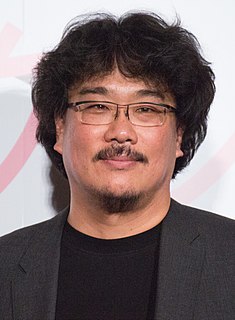A Quote by Bong Joon-ho
The multilevel, the conscious and the unconscious, is natural when I write scripts, when I come up with ideas and stories.
Related Quotes
Big ideas come from the unconscious. This is true in art, in science, and in advertising. But your unconscious has to be well informed, or your idea will be irrelevant. Stuff your conscious mind with information, then unhook your rational thought process. You can help this process by going for a long walk, or taking a hot bath, or drinking half a pint of claret. Suddenly, if the telephone line from your unconscious is open, a big idea wells up within you.
I'm not a wildly gifted person; I don't play an instrument or speak another language or have great accomplishments in another field, as many writers do. But writing feels natural to me; the act of it seems to free up my unconscious, so that sometimes I feel that I have access to more ideas and information than my conscious mind could think up.
If you write, good ideas must come welling up into you so that you have something to write. If good ideas do not come at once, or for a long time, do not be troubled at all. Wait for them. Put down little ideas no matter how insignificant they are. But do not feel, any more, guilty about idleness and solitude.
a novel is not born of a single idea. The stories I've tried to write from one idea, no matter how terrific an idea, have sputtered out and died by chapter three. For me, novels have invariably come from a complex of ideas that in the beginning seemed to bear no relation to each other, but in the unconscious began mysteriously to merge and grow. Ideas for a novel are like the strong guy lines of a spider web. Without them the silken web cannot be spun.
I started writing because I wanted to write scripts, but I wasn't very good at it. Then I started writing short stories, sort of as treatments for the film scripts, and I found I enjoyed writing short stories far more than I enjoyed writing film scripts. Then the short stories got longer and longer and suddenly, I had novels.
The best indicator of your level of consciousness is how you deal with life's challenges when they come. Through those challenges, an already unconscious person tends to become more deeply unconscious, and a conscious person more intensely conscious. You can use a challenge to awaken you, or you can allow it to pull you into even deeper sleep. The dream of ordinary unconsciousness then turns into a nightmare.
Why do I like to write short stories? Well, I certainly didn't intend to. I was going to write a novel. And still! I still come up with ideas for novels. And I even start novels. But something happens to them. They break up. I look at what I really want to do with the material, and it never turns out to be a novel.
During the course of the year a number of ideas just come up automatically. I could be walking down the street. Or shaving. An idea will hit me and I'll write it down. Then, when I'm ready to write, I check my little matchbooks and napkins and find that it is good or it's pretty terrible. There are other times when I don't have any ideas and I'll go into a room and close the door and I sit and sweat it out for a day or a month and eventually I come up with [something].
I wrote lots of scripts that never got made and they were terrible. I thought they were good at the time. You can't write two scripts and expect your career to take off. Keep writing. Be you. Be original. A lot of people go for a genre, which is fine if you can do that really well, but we all have such layered histories. We all come from a unique background. Write about your past, write about you. Or make stuff up, but make it about something that really matters.
Now some people when they sit down to write and nothing special comes, no good ideas, are so frightened that they drink a lot of strong coffee to hurry them up, or smoke packages of cigarettes, or take drugs or get drunk. They do not know that ideas come slowly, and that the more clear, tranquil and unstimulated you are, the slower the ideas come, but the better they are.
No one cares about your ideas. They're not going to come knocking on your door looking for ideas. They're going to want some concrete evidence that you have the potential to serve them or give them value for money. So that's my advice: write your spec scripts, no matter what. They're essential as a calling card, even if they don't get produced.
I use [Heraclitus' discovery of] enantiodromia for the emergence of the unconscious opposite in the course of time. This characteristic phenomenon practically always occurs when an extreme, onesided tendency dominates conscious life; in time an equally powerful counterposition is built up, which first inhibits the conscious performance and subsequently breaks through the conscious control.




































